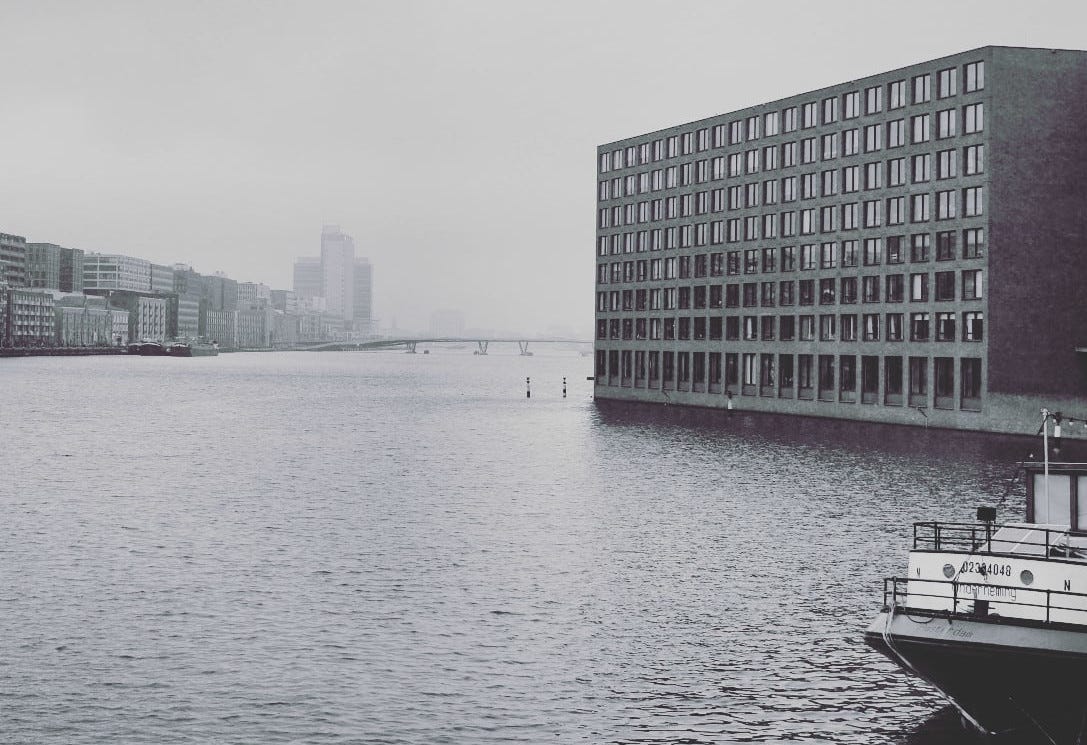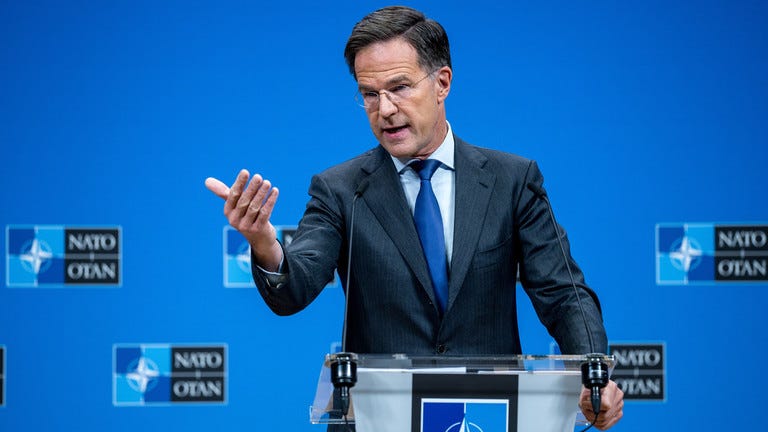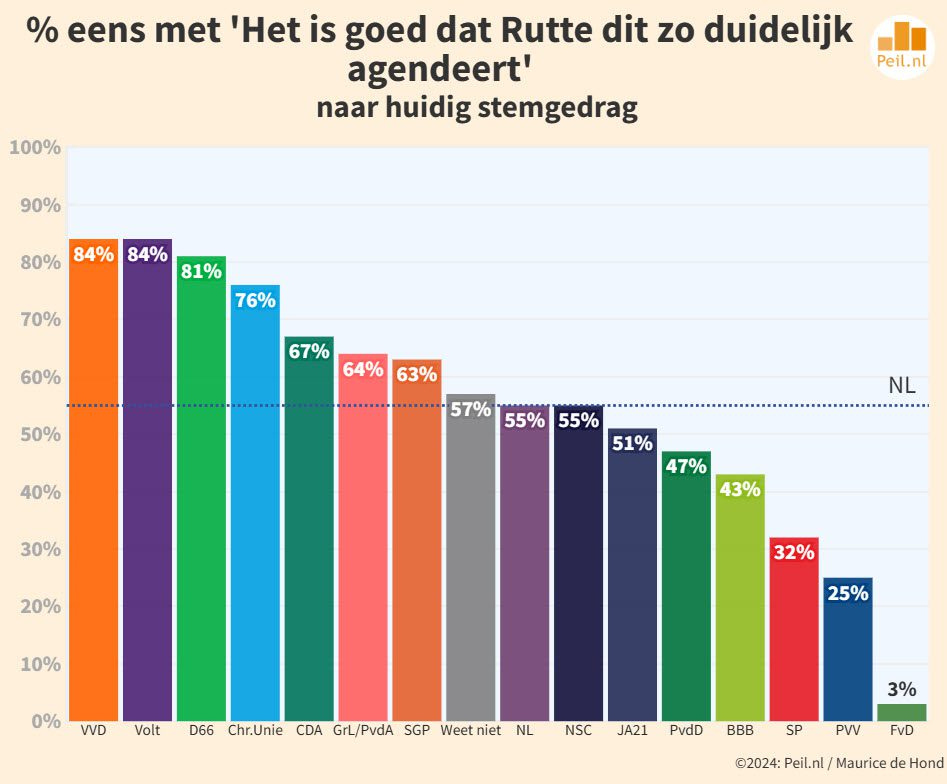NATO's Mark Rutte: more guns, less butter
To heck with diplomacy, the path to peace in Europe lies through an arms race with Russia. Cui bono?
Former Dutch prime minister Mark Rutte, who assumed the post of secretary general of NATO on 1 October, recently spoke at an event in Brussels organized by the Carnegie Endowment for International Peace, a US-based think-tank. Not surprising for the NATO chief, he is calling for higher arms spending in Europe:
“I know spending more on defense means spending less on other priorities. But it is only a little less,” Rutte said on Thursday.
“On average, European countries easily spend up to a quarter of their national income on pensions, health and social security systems. We need a small fraction of that money to make our defenses much stronger, and to preserve our way of life,” he added.
While NATO members are spending more of their GDP on the military than a decade ago, that’s nowhere near the Cold War levels, Rutte argued, noting that the US-led military bloc will “need a lot more than 2%” if it wants to defend Europe against an allegedly aggressive Russia.
Spending billions on weapons will bring security, Rutte argued, and “without security, there is no freedom for our children and grandchildren. No schools, no hospitals, no businesses. There is nothing.”
He urged the audience to tell their governments that “security matters more than anything” and that they “accept to make sacrifices today so that we can stay safe tomorrow.”
“Tell your banks and pension funds it is simply unacceptable that they refuse to invest in the defense industry,” Rutte said. “Defense is not in the same category as illicit drugs and pornography. Investing in defense is an investment in our security. It’s a must!”
“NATO tells members to divert social spending to militaries”, 12 Dec, 2024, RT)
Since when do banks and pension funds invest in those naughty activities? Does Mr Rutte know something we do not? Leaving aside Mark Rutte’s clumsy, ill-considered rhetoric, there are of course the underlying economic hard realities. Speaking last week to Judge Andrew Napolitano on the latter’s popular Judging Freedom channel on YouTube, former British diplomat Ian Proud, who served in Russia, points out the following:
European countries of NATO already spend 3.3 times more than Russia spends on defense. If they increase their spending to 3% which Donald Trump is recommending that figure would go up to five times more than Russia. The question is how much more than Russia do you need to spend on defense before you feel safe?
Proud went on to say that this already bloated defense spending is primarily about “lining the pockets” of the big arms contractors in Europe and the US; it has has nothing to do with security. For this reason, Proud thinks that, Trump’s bombast notwithstanding, Washington will not pull out of NATO given that US defense contractors would lose billions of dollars every year in business from Europe. “Donald Trump is close to those defense contractors and close to the politicians who receive substantial campaign donations from those defense contractors”, he observes. (Source: Ian Proud - (fmr British Diplomat to Russia) : NATO Building An Arsenal)
While Europeans may have been enthusiastic about hanging blue and yellow flags from their windows to demonstrate their solidarity with and support for Ukraine, there are increasing signs that among the the public (in contrast to our deluded leaders) there is no appetite for military conflict with Russia. Here in the Netherlands, polling data recently compiled by the veteran pollster Maurice de Hond, who I cite regularly in these pages, caught my eye. De Hond’s poll published on his website on 15 December (“Eerste peiling na TK2023 met PVV op verlies”) presented the following statements, indicating the percentage of respondents who were in agreement:
It is good that Mark Rutte puts this on the agenda so clearly (55%)
The dangers are greatly exaggerated by him (32%)
This approach only increases the chance of war (35%)
The extra money needed should be found by lowering benefits and health care costs (20%)
Pension funds should invest more in Dutch companies that make weapons (40%)
The Netherlands should provide troops to fight in Ukraine (12%)
This approach will lead to further destabilization in Europe (34%)
Most interestingly, De Hond broke down the reaction to the first statement by party affiliation and the graph below maps this to the fifteen parties represented in the Tweede Kamer, the Dutch Lower House:
The three columns on the left, representing voters most sympathetic to Mark Rutte’s sentiments, are the VVD (his former party), Volt, a pro-EU party whose electoral program promotes further European unification, and D66, an equally fervent supporter of the EU. No surprises here.
However, on the right side, more skeptical voters are represented by three parties (leaving the FvD aside for the moment) which reflect a populist groundswell against the established order: a relative newcomer, the BBB (Farmer-Citizen Movement), Geert Wilder’s PVV (currently the largest party in the Netherlands), and finally the SP, the Dutch Socialist Party, representing what you might call the traditional anti-imperialist Left. Together they hold 49 seats, 52 if you add the FvD, roughly a third of the Tweede Kamer.
The terms “populism” and “populist” are problematic; I don’t think they adequately describe the new realities. Moreover, within the context of mainstream narratives, these labels are used pejoratively; “populism” is a threat that needs to be combated and contained. Thing is, if you are against populism, what are you for? Increased elite control? It is our wretched elites who have gotten us into this predicament and expecting them to solve our mounting problems is a fool’s errand.
For now, let’s call these parties “anti-establishment” for the lack of a better term. Within this spectrum, those of a more rightwing character have gained considerably wider traction in Europe than those with leftwing leanings, though the latter does exist, most visibly in the form of Sahra Wagenknecht’s BSW. As such, one not agree with everything the anti-establishment parties of various flavors stand for, but if only with regard to NATO’s big push for vastly increased arms spending and unbridled militarism, their instincts are absolutely correct.
The European political establishment will try everything it can to resist this continent-wide shift in public opinion and voting trends, up to and including nullifying elections that produce “incorrect” outcomes, as we saw earlier this month in Romania. Ultimately such resistance will be futile,though it may take several election cycles for the system to be fundamentally reorganized.
As for Mark Rutte, the Ukraine project is an existential issue for NATO; the inevitable, forthcoming collapse of the Ukraine military will reveal to all what a paper tiger this obsolete entity has long since become. The bellicose and ill-considered rhetoric of this opportunistic and tone-deaf weapons salesman will hence only continue.
I wish my readers a pleasant holiday season!





he is a dangerous warmonger
"As for Mark Rutte, the Ukraine project is an existential issue for NATO; the inevitable, forthcoming collapse of the Ukraine military will reveal to all what a paper tiger this obsolete entity has long since become. The bellicose and ill-considered rhetoric of this opportunistic and tone-deaf weapons salesman will hence only continue." I am counting down for that day for everyone actual safety in Europe.